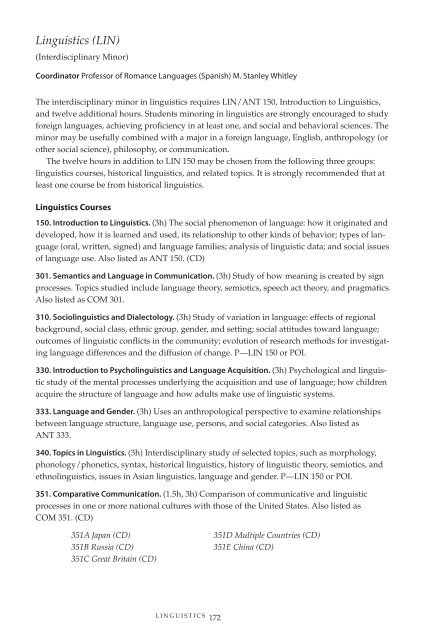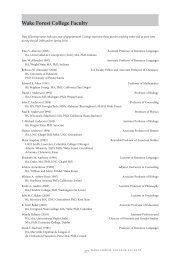theundergraduateschoo ls - Wake Forest University
theundergraduateschoo ls - Wake Forest University
theundergraduateschoo ls - Wake Forest University
You also want an ePaper? Increase the reach of your titles
YUMPU automatically turns print PDFs into web optimized ePapers that Google loves.
Linguistics (LIN)<br />
(Interdisciplinary Minor)<br />
Coordinator Professor of Romance Languages (Spanish) M. Stanley Whitley<br />
The interdisciplinary minor in linguistics requires LIN/ANT 150, Introduction to Linguistics,<br />
and twelve additional hours. Students minoring in linguistics are strongly encouraged to study<br />
foreign languages, achieving proficiency in at least one, and social and behavioral sciences. The<br />
minor may be usefully combined with a major in a foreign language, English, anthropology (or<br />
other social science), philosophy, or communication.<br />
The twelve hours in addition to LIN 150 may be chosen from the following three groups:<br />
linguistics courses, historical linguistics, and related topics. It is strongly recommended that at<br />
least one course be from historical linguistics.<br />
Linguistics Courses<br />
150. Introduction to Linguistics. (3h) The social phenomenon of language: how it originated and<br />
developed, how it is learned and used, its relationship to other kinds of behavior; types of language<br />
(oral, written, signed) and language families; analysis of linguistic data; and social issues<br />
of language use. A<strong>ls</strong>o listed as ANT 150. (CD)<br />
301. Semantics and Language in Communication. (3h) Study of how meaning is created by sign<br />
processes. Topics studied include language theory, semiotics, speech act theory, and pragmatics.<br />
A<strong>ls</strong>o listed as COM 301.<br />
310. Sociolinguistics and Dialectology. (3h) Study of variation in language: effects of regional<br />
background, social class, ethnic group, gender, and setting; social attitudes toward language;<br />
outcomes of linguistic conflicts in the community; evolution of research methods for investigating<br />
language differences and the diffusion of change. P—LIN 150 or POI.<br />
330. Introduction to Psycholinguistics and Language Acquisition. (3h) Psychological and linguistic<br />
study of the mental processes underlying the acquisition and use of language; how children<br />
acquire the structure of language and how adults make use of linguistic systems.<br />
333. Language and Gender. (3h) Uses an anthropological perspective to examine relationships<br />
between language structure, language use, persons, and social categories. A<strong>ls</strong>o listed as<br />
ANT 333.<br />
340. Topics in Linguistics. (3h) Interdisciplinary study of selected topics, such as morphology,<br />
phonology/phonetics, syntax, historical linguistics, history of linguistic theory, semiotics, and<br />
ethnolinguistics, issues in Asian linguistics, language and gender. P—LIN 150 or POI.<br />
351. Comparative Communication. (1.5h, 3h) Comparison of communicative and linguistic<br />
processes in one or more national cultures with those of the United States. A<strong>ls</strong>o listed as<br />
COM 351. (CD)<br />
351A Japan (CD) 351D Multiple Countries (CD)<br />
351B Russia (CD) 351E China (CD)<br />
351C Great Britain (CD)<br />
L I N G U I S T I C S 172






